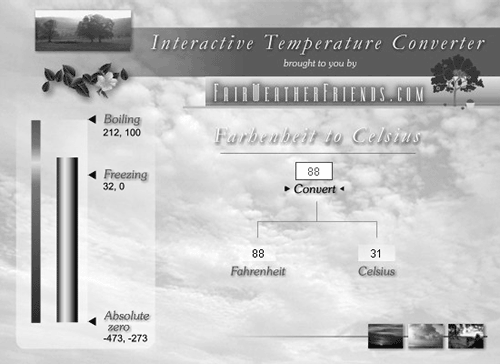Lesson 6. Creating and Manipulating Data
When you use Flash to create an application, you use the Text tool to enter information directly onto the stage. Text that you enter in this manner is said to be hard coded because it's permanent once the SWF file is published. If you want to alter data that's hard coded into your Flash application, you must edit the Flash source filea cumbersome and unnecessary process because Flash lets you define areas where text can be displayed dynamically. Instead of being set when the SWF is published, dynamic data is processed and stored at run time (while the SWF file is running), which means you can change it as often as you want. Dynamic data can be user-supplied information, data loaded from another file, or even information you can't control, such as the current time. You can use this type of data to display information, make decisions, manipulate the position of movie clips, and much more.
This temperature converter manipulates data by converting values from one scale to anotherFahrenheit to Celsius.

In this lesson, you'll learn how to create objects, variables, and arrays (all elements of a data-driven project), as well as how to manipulate data already within your project (such as numbers and strings of text) in order to display your data in new and useful ways.
WHAT YOU WILL LEARN
In this lesson, you will:
Learn the power of dynamic data
Create text fields
Create variables
Create arrays
Store information in objects
Retrieve information from storage dynamically
Build expressions
Learn about precedence
Manipulate numbers with the Math class
Gain experience with the methods of the String class
APPROXIMATE TIME
This lesson takes approximately one and one half hours to complete.
LESSON FILES
Starting Files:
Lesson06/Assets/newsFlash1.fla
Lesson06/Assets/tempConverter1.fla
Lesson06/Assets/madlibs1.fla
Completed Projects:
newsFlash5.fla
tempConverter2.fla
madlibs2.fla







